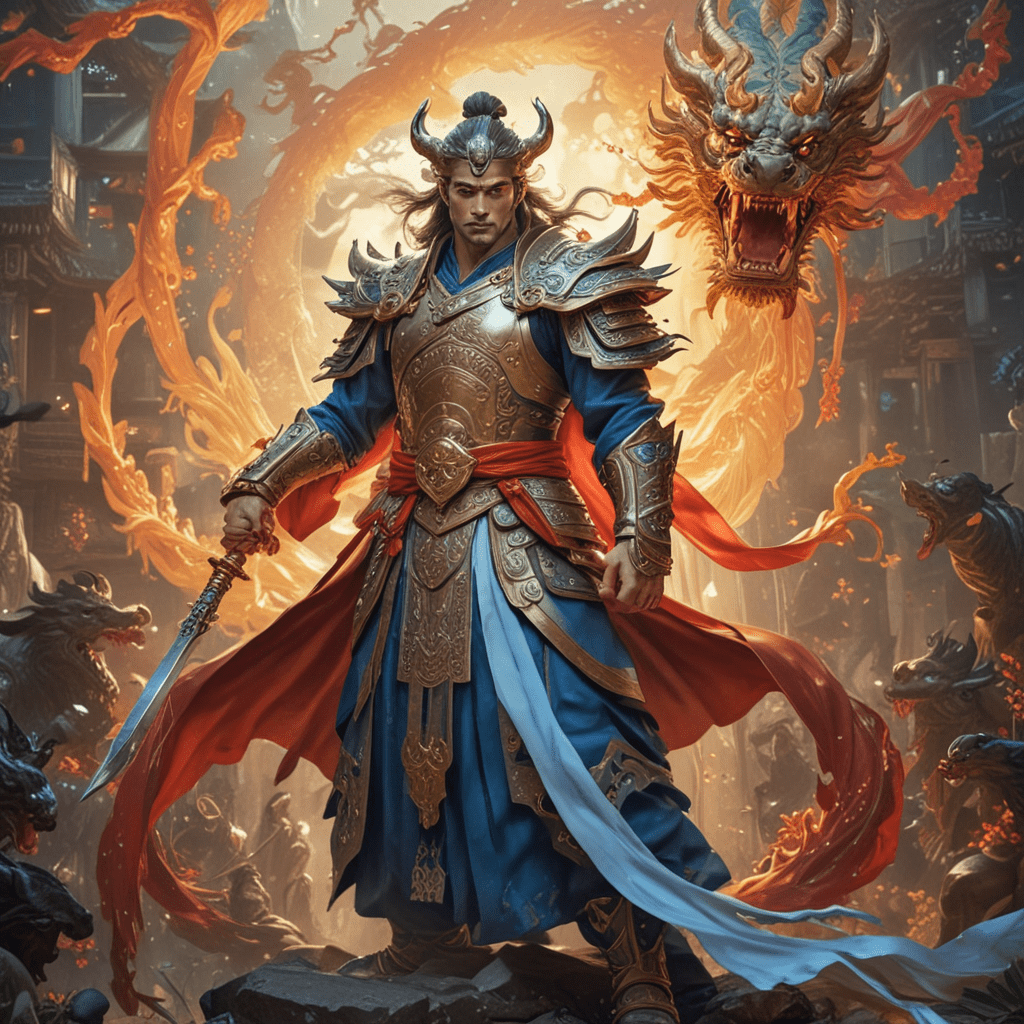Chinese Mythological Heroes in Literature and Art
Chinese mythology is a rich tapestry of captivating tales and unforgettable characters. These mythical heroes have played a pivotal role in shaping the cultural landscape of China and continue to inspire and fascinate people around the world through their presence in literature and art. From the primordial goddess Nu Wa to the legendary Monkey King, these heroes embody the human spirit's resilience, ingenuity, and unwavering pursuit of the extraordinary.
Nu Wa: The Creator Goddess
Nu Wa stands as a cornerstone of Chinese mythology, revered as the creator of humanity. According to legend, she molded humans from clay, breathing life into them and giving them the ability to speak and think. Nu Wa is often depicted as a beautiful woman with a snake-like tail, and her image is frequently used in Chinese art and literature to symbolize creativity and the origins of life. Her transformative power and connection to the natural world have made her an enduring figure in Chinese mythology.
Gonggong: The Water God
Gonggong, the wrathful water god, embodies the destructive forces of nature. Legends describe him as a fearsome deity with a human head and a serpent's body. Gonggong's anger is said to have caused the catastrophic floods that once ravaged the earth, leading him to become a symbol of chaos and uncontrollable power. His destructive nature has often been depicted in Chinese literature and art, serving as a cautionary tale about the dangers of unchecked rage and the importance of maintaining harmony with the natural world.
Yan Emperor and Huang Emperor: The First Ancestors
Yan Emperor and Huang Emperor are revered as the first ancestors of the Chinese people. Yan Emperor, believed to have ruled in the north, is associated with agriculture and farming, while Huang Emperor, who ruled in the south, is credited with introducing medicine and writing. These legendary figures represent the origins of Chinese civilization and are often depicted together in art and literature as symbols of unity, wisdom, and the enduring legacy of the Chinese people.
King Yu: The Flood Controller
King Yu is renowned for his legendary feat of controlling the devastating floods that plagued ancient China. Armed with divine tools, he tirelessly worked to channel the floodwaters, ultimately bringing prosperity and stability to the land. Yu's perseverance and determination in the face of adversity have made him a revered figure in Chinese mythology, often depicted as a symbol of resilience and the triumph of human ingenuity over the forces of nature.
Erlang Shen: The Monkey King’s Nemesis
Erlang Shen, the nephew of the Jade Emperor, is a powerful deity renowned for his ability to subdue the mischievous Monkey King. Armed with his trusty Three-Pointed Double-Edged Sword and a loyal hound, Erlang Shen represents the forces of order and justice. His battles with the Monkey King symbolize the eternal struggle between good and evil, making him a popular figure in Chinese literature and art.
Sun Wukong: The Monkey King
Sun Wukong, the Monkey King, is undoubtedly one of the most beloved and iconic characters in Chinese mythology. Born from a magical stone, Wukong possesses superhuman strength, the ability to fly, and a mischievous nature that often leads him into trouble. His legendary journey to the West in search of enlightenment has captivated generations of readers, inspiring countless adaptations in literature, film, and television. Wukong's rebellious spirit and unwavering determination have made him a symbol of freedom and individuality in Chinese culture.
Nezha: The Lotus Prince
Nezha, the Lotus Prince, is a renowned deity known for his extraordinary birth and unwavering loyalty. Born from a lotus flower, Nezha possesses immense strength and wields a variety of magical weapons. His story, often depicted in Chinese opera and art, centers around his battles against evil forces and his unwavering devotion to his family and friends. Nezha's courageous nature and powerful abilities have made him a beloved figure in Chinese mythology, symbolizing the triumph of good over evil.
Guan Yu: The God of War
Guan Yu, the God of War, is a revered figure in Chinese mythology and history. Initially a mortal warrior, Guan Yu's loyalty, bravery, and martial prowess earned him divine status. He is often depicted as a fearsome warrior with a distinctive red face and a long beard. Guan Yu's image is widely used in Chinese temples and homes as a symbol of protection and military might. His unwavering loyalty and righteous nature have made him a popular figure in literature, art, and religious practices.
Xi Wangmu: The Queen Mother of the West
Xi Wangmu, the Queen Mother of the West, is a powerful and enigmatic figure in Chinese mythology. Ruling over the Kunlun Mountains, she is often associated with immortality and the secrets of the universe. Xi Wangmu is said to possess a garden where peaches that confer eternal life grow, and her image is frequently used in Chinese art and literature to symbolize wisdom, longevity, and the pursuit of enlightenment. Her mysterious nature and connection to the supernatural have made her a captivating character in Chinese mythology.
FAQs
Who is the creator goddess in Chinese mythology?
Nu Wa is the creator goddess in Chinese mythology, believed to have molded humans from clay and given them life.
Which mythical figure is known for controlling the devastating floods in ancient China?
King Yu is renowned for his legendary feat of controlling the catastrophic floods that once ravaged the land.
Who is the Monkey King's nemesis in Chinese mythology?
Erlang Shen, the nephew of the Jade Emperor, is a powerful deity known for his ability to subdue the mischievous Monkey King.
Which Chinese deity is revered as the God of War?
Guan Yu is a revered figure in Chinese mythology and history, known as the God of War and symbolized by his loyalty, bravery, and martial prowess.


